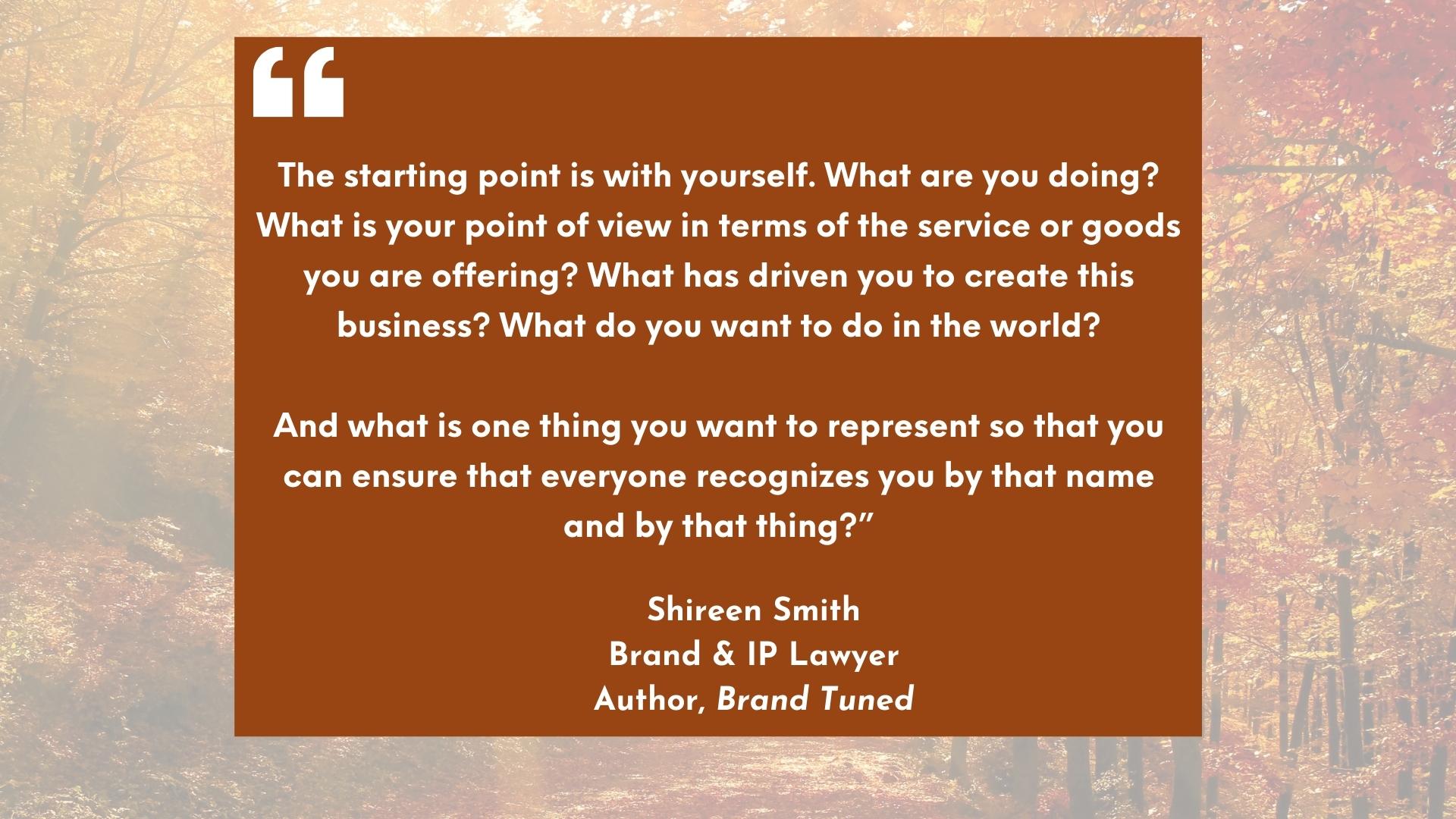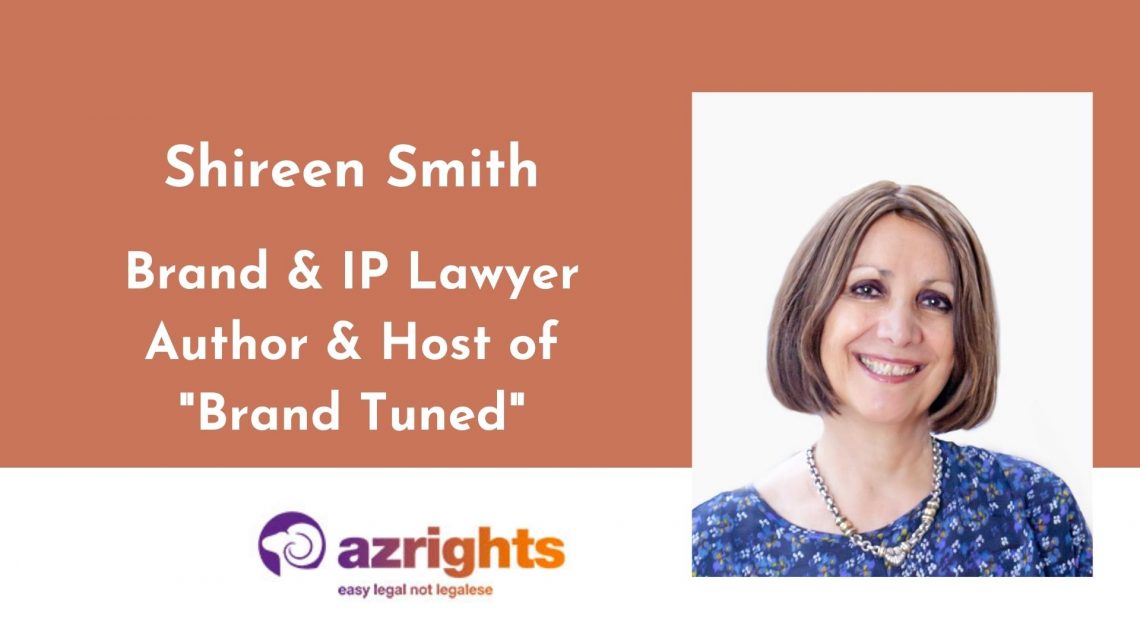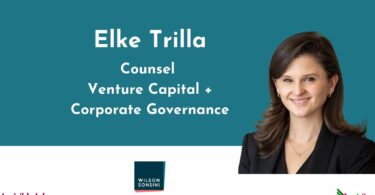About
Shireen Smith is a lawyer who specializes in the legal aspects of branding, having graduated from London University’s QMW with a masters’ degree in intellectual property and run her own specialist IP law firm Azrights since 2005. She is also a trained marketer and brand manager, and offers brand consultancy through Brand Tuned.
Summary
Do you believe in any of these? That building a bankable brand is all about smart marketing? That legalese is for later, when you’re bigger and making lots of money? That once you snag the domain name of your choice, your brand is safe? If you do, you just might be setting your business for a lot of pain later.
In this episode, Shireen Smith, author of Brand Tuned, and IP and branding expert , reveals common myths about branding and law that trips up may new and small business entrepreneurs and provides immediately actionable tips on how to create, build and protect a high-value brand for your business for the long haul.
Episode highlights
- How neglecting brand law led a once-hot app to ruin
- How to tell the difference between a great rand name and a bad one, from a legal perspective
- Why the single decision about your product category is so important to your brand value
- An unusual tip for selecting smart brand names
- What many hot startups get wrong about picking a smart brand name
- How one little-known step can help save you thousands of dollars on your brand
- How to use temporary brand names the smart way and still make big progress on building your business
- Special tips for makers of physical products on their brand decision
- How to find the best brand lawyer for your business
- Simple steps to protect your brand that anyone can take
Links & Resources
Azrights – Shireen Smith’s award-winning brand consulting firm
Brand Tuned – Shireen Smith’s podcast on branding
Brand Tuned – Shireen Smith’s book on the new rules of branding, strategy and intellectual property

Interview transcript:
Shubha Chakravarthy: Thank you, Shireen, for joining us today. You are the author of this book called “Brand Tuned”, which I’m a huge fan of. I discovered it accidentally and it captivated me, tell us a little bit about it as it is in an unusual space. How did you come to do the work you are doing?
Shireen Smith: Thanks for having me here. I’m a lawyer by background, an intellectual property lawyer, and I was seeing a number of similar problems that business owners had around branding, which is that they were totally unaware of their intellectual property and the impact it has on their business and at the same time I knew many designers and marketers who are not trained in branding and law at all, then IP and everything you are doing when you create a brand involves creating intellectual property.
So, I thought, I need to really understand what branding is so I can explain to designers and marketers where they need to really focus in order to better support business owners because if business owners are going directly to branding professionals, they are not getting any IP input and IP is left till the last moment when it actually needs to be considered first, even before you create.
I then went on to train in brand management and marketing as well because I think branding is the sort of area where you need intellectual property marketing and design understanding to really bring a holistic set of skills to the table.
Shubha Chakravarthy: I’m sure you worked with a lot of entrepreneurs and I’m sure a lot of them have missed the branding and the IP aspect. Do you have any stories that pop into mind?
Shireen Smith: There’s a story I’ve got in the book, one that is quite famous, about “Scrabulous”. They had created this app to play a Scrabble-like game online and it had millions of followers on Facebook. When Hasbro found out about them, they sent a take-down notice to Facebook because the name is too similar to Scrabble Facebook then pulled them off the platform and Scrabulous was suddenly no more.
That happened because they weren’t aware that a name that’s too similar to somebody else who is an existing brand owner is a problem to such an extent that they actually went to register their trademark at the US PTO. They did it themselves and that is what brought them to the attention of Hasbro.
Shubha Chakravarthy: It sounds like they did that a little too late in the game, after they had achieved all this market traction and fame for Scrabulous, right?
Shireen Smith: Yeah. That’s often what happens. People think they need to wait until they’ve got something worth protecting and then they go to protect it.
But of course, in their case it was a poor name to be using because they’ve probably had a lot of the success they had because of the name being similar to Scrabble. But if they’d taken some advice before they applied to register that trademark, they might’ve been able to quietly rebrand and choose a different name but as it was, they lost the sort of market leading opportunity that they had uncovered and Zynga entered the market with “Words with Friends”.
Scrabulous still exists. I don’t know what they are called but they just completely lost that momentum that they had gained by being the first to market.
Shubha Chakravarthy: It sounds like a rose by some other name wouldn’t smell as sweet, at least in the branding business.
Shireen Smith: Yes! You need to be very careful not to choose names that are similar to others in the industry. Other people who are advising you, may know about Scrabble, they may know about Apple, but if you come from an industry where you know the market leader and you choose a name similar to that, that other people don’t know about, then nobody can even warn you that and say, “Hey, you’re using a name that’s too similar to this famous brand.”
I knew a potential client who were ringing around to get help. They had had their domains confiscated in a domain dispute because the name they had chosen was similar to the market leaders in their industry. Then, eventually they lost their domains and had to start again. They’d spent about 200,000 getting momentum, getting this fantastic website up and working, and all that was gone because the value was in the domain name which they had brought up in the search engines and then they lost it because of a trademark issue.
Shubha Chakravarthy: It sounds like it’s not just the mental space you have in your customers’ minds but also real money that you spend on buying a domain, on search engine marketing. All of that goes away if you are not careful about IP and the brand implications of the name you’ve chosen.
What is clear though is that the brand name intersects with the law and the IP side. So, if I’m an entrepreneur starting off, are there like 5 areas that should immediately trigger something that says, “Hey — IP!” What are those areas in your mind?
Shireen Smith: The name. You definitely need to get a lawyer to search the name for you and give you advice on it. So, even if you are going to be registering your own trademark, I think you need a lawyer to actually give you the okay signal with the name. That I would say is essential to spend money on.
Then because everything you do in a business is getting name recognition, you need to make sure you own the name that you are using. It is just taken for granted by people until they lose their name or something happens. But it is one of the most solid issues that you have got to deal with in a business.
I often advise people if they are starting and don’t have much money — to use a temporary descriptive name that you can’t register as a trademark because then you can avoid all the costs associated with trademarks and legal advice. You can just test your business concept and if it is successful, then you can go and choose a lane and register as a trademark.
Shubha Chakravarthy: The two main things that I took away from that are, one — make sure that it is your name. Everything starts with the name. Then secondly — if you are not sure and you are starting out, then it’s okay to start with a temporary name.
Shireen Smith: I think it is a good idea to start with a temporary name and also, domains and company registrations don’t give you the rights you need in a name. So, it is trademarks that say you have the rights to a name.
Shubha Chakravarthy: You talked about the name and how important the name is in the book. You talk about some do’s and don’ts about how to name your business and how not to, would you just give us a high level on how to pick the right name for your business?
Shireen Smith: There are lots of issues around names, quite subtle issues. One is that it shouldn’t be too descriptive of the category. So, the more distinctive name you have, that means that it is just a name — like Google is just or Zumba is just a name. The more distinct it is, the easier it is going to be for you to protect your brand, and to register your trademark. It is going to be cheaper to do a search in every way.
On the other hand, people tend to want to describe what they are doing so that it has some sort of a marketing benefit and that is where it is more difficult to find an ownable name or even if you own the name, you get a very narrow scope of protection so that somebody else could use something very similar and you wouldn’t be able to stop them.
Getting away from this need to describe what you do when you choose a name is so important. “McDonald’s” isn’t saying it sells burgers. “Burger King” tends to be on the descriptive side because it says “burger”. You can’t monopolize a term that others in the industry need to use. So, “burger” can never belong to you. All you are getting is “Burger King”. Whereas McDonald’s is totally distinctive. It’s got nothing in it that describes burgers and therefore they have better brand protection as a result.
So “Oatly” is another example that came up recently. They tried to stop this other company using “PureOaty” as a name. They said that it is too similar to “Oaty”, but “Oaty” is a generic term and the law in no part of the world will give you a monopoly over a generic term. So, they only managed to get a trademark because they added the “L” in and that’s even though they are are a famous and well-known brand who usually get greater protection than lesser-known brands. Even despite that they weren’t able to object to somebody calling themselves “PureOaty”.
Whereas, if it had a distinctive name, say it was “Hellman’s” — like “Hellman’s Mayonnaise”. If somebody tried to call it “Pure Hellman’s”, that would be trademark infringement. So, it is really important to choose a distinctive name if you can.
Shubha Chakravarthy: Yes and on that of late, I’ve seen some startups who use a very different spelling for common names — and I myself have a business like that.
So, for example, you name your company “Prosprr” or “Contently”. What is your take on things , that could refer to generic name but are spelled differently enough that you can argue that it is a brand name. What is the law in that?
Shireen Smith: The spelling doesn’t make a name trademarkable but they do that in order to be able to get the ”.com” domain. So, “Fiverr” is spelled with a double “R” so that you can get the domain name but that doesn’t make it trademarkable. Whether something is trademarkable or not is not determined by the spelling. It is more — what it represents in your category.
For example, if you are a pizza place and you want to call yourself “Fresh Pizza”. That’s not going to be trademarkable because other pizza owners might want to call themselves that and their pizzas, “fresh pizzas”. But if you are selling umbrellas and you want to call your business “Fresh”, then it is totally distinctive in umbrellas and you can own it.
There is always this context of whether a name can be used as a trademark in your category. So, is it a term that other traders need to use or not? If it is then it is too descriptive, but if it is not — because who wants to say “fresh” umbrellas? Then that is a totally okay name to use and you can go ahead and trademark that.
Shubha Chakravarthy: You just brought up a very important concept, which is this concept of category. It sounds like you need to be very clear about what your category is before you go ahead and make a call on your brand name.
Can you provide some guidance to a new entrepreneur? How do I come up with the right category? In some cases where I’m selling pizza, it is obvious. But are there other subtle guidelines that an entrepreneur can keep in mind as they determine the category?
Shireen Smith: It depends on what your vision for your business is. What services are you going to be offering? What products are you going to be selling? Essentially, those are trademark classes. The trademarks are registered by reference to goods and services. So, you need to know the categories. If you are selling clothing, for example, and jewelry, footwear and umbrellas, then they are all going to be in different categories. So, you will need to register in several different classes.
So, understanding the trademark categories helps in terms of what you are going to be offering. So, that’s the starting point before you choose any name. “What is your vision for the business?” That is some other work you need to do before you even think of naming the business so that you choose a name that is a good one.
Shubha Chakravarthy: So, you already started laying out some of the things an entrepreneur needs to keep in mind. “What is the name? What is the category?” You also talked about some precursors to the actual brand names, such as the business vision.
Can you talk about the high level if I’m starting out and I have this business, what are the things that will feed into the brand? The top four or five things I need to keep in mind as I go ahead and take a protectable brand name.
Shireen Smith: Well, I think the starting point is with yourself, “What are you doing? What is your point of view in terms of the service or goods you are going to be offering? What has driven you to create this business? What do you want to do in the world?”
Your vision, what is driving you, what your mission is, and what your values are, are things that require quite a lot of introspection. You need to sit down and really give yourself time and space to think them through because they then help you to decide what positioning you want to adopt in the market.
Positioning is called all sorts of different names which mean the same thing, people sometimes call it brand purpose, brand essence, or brand promise. They all mean essentially the same thing — a brand if you think about it is a set of associations that people have. So, when I think of Apple — I think design. Maybe you would also think that, or when I think of Google, I think of organizing information.
These things that stick in people’s minds about a brand that they associate with it, that is their positioning and you really need to think in terms of one word. “What is one thing you want to represent so that you can ensure that everyone recognizes you by that name and by that thing?”
For example, I want to create some courses on branding for people in branding and IP and I think what I want is to deliver confidence. So, I want people to have more confidence as a result of say — gaining more wisdom, but it is essentially the word I have decided is really important and I’m going to make sure everything I do in the business is designed to generate more confidence in the students.
One aspect is thinking what you want to do and another aspect is thinking about the market. What is currently on offer in that space that you are entering? For me, “What other courses are there in branding and IP and how can I be different from what they are offering? How can I do things in my way, but in a way where it is going to better meet the needs of a segment of the market that I want to serve”, because you can’t serve everyone. Ultimately you have to choose who is going to be the most ideal target customer for what you want to deliver.
Shubha Chakravarthy: So, if I’ve already synthesized what I just heard, it sounds like you start with a context, which is a category and then you figure out who your customer is and what they want or what you want them to associate with you. Is that right?
Shireen Smith: After you’ve decided what you want to deliver, what is your point of view about your category? I think IP is essential and this is something that marketers and designers need to know. It is just not something that is optional because it is intrinsic to branding when you are creating a brand.
So, that’s my point of view. I feel very strongly about that. That introspection and decision about what is important to you then feeds into what you decide you are going to do and after that you come up with how you want to position your brand in order to be known in the market.
Shubha Chakravarthy: Then we come to this concept where in the early days of a business it is possible that you are not sure and you pivot to something else and the pivot may actually change your category. How should an entrepreneur think about branding and IP in those situations where I start out thinking that I want to be an e-commerce business and then I pivot to maybe food service?
Shireen Smith: That is why I think it is really important to have a temporary name and test your concept first for three-six months. A lot of people I see have been in business for a year. They might have done that pivoting because you can only respond to the market once you are actually in the market selling something.
So, it is a good idea to have a temporary view. It depends on the category and what you are doing, but if it is possible, then take a sort of more temporary approach to your branding, to your name, and everything, and test the market for six months or a year and learn and then go and get a wonderful name and then focus on branding.
Shubha Chakravarthy: Have you seen in your practice or otherwise, examples of good temporary names or case guidelines on how you pick one?
Shireen Smith: As long as you are not going to be stepping on somebody’s toes, in terms of immediately getting a cease and desist letter from someone, it can almost be anything.
I’ve seen people combine their surnames. Say one has a surname beginning with W and the other has a surname beginning with D and they get together and they’ve created a word around them which works for them for a year or so, but once they’ve gotten off the ground, they actually decided that it wasn’t such a good name.
Often names are really difficult to arrive at. So, it may be that the name you choose isn’t something you actually like that much after you’ve been in business. If you don’t love the name that you’ve got and you’ve got this temporary approach to things but you later decide you do want to trademark, you don’t have to immediately go and register a trademark. But if it is a name you really like and you think is clever and it is important to you, then I think that you should register it as a trademark.
As long as it doesn’t look like you are obviously going to have a problem, then you can get up in a way with a temporary name, which you might later decide to keep, or you might not.
Shubha Chakravarthy: So, you try to get as close as possible to what you want to be but recognizing that may not be the name you end up with sounds like the approach you are recommending.
Shireen Smith: It depends so much on the business you are entering. If you are going to be producing clothes and you are a fashion designer and you are going to put your label on your clothes then you can’t just have a temporary name as you can’t trademark that because a product would have to be recalled if there is a problem with it.
So, you can’t take that approach. But if you’ve got the sort of business where the name is not going to be a disaster if you need to change it, then you could adopt a different approach, which is to either choose a name that you can’t even register as a trademark or choose one you could register, but you just don’t register it yet because you are not sure if the business concept is going to be tweaked or not. If you’ve got a platform, for example, you absolutely need to have the name nailed down because if you are building recognition for a platform you can’t change the name.
So much depends on what you are doing as to how important it is to choose your final name and register it as a trademark when you start.
Shubha Chakravarthy: I want to probe a little bit into why I made this mistake myself. A lot of entrepreneurs don’t pay attention to IP thinking, “I’m too small. It’s too soon.”
Why do you think that is the case and what can entrepreneurs do to prevent themselves from falling into this line of thinking?
Shireen Smith: Well, I think there’s a lot in the world that has changed because of the internet. We’ve only had the internet for about 20 years now and so pre-internet, it was actually very expensive to search the trademark registers to register a trademark.
You had to go manually to the offices. It was an altogether different experience. It was something really only successful businesses could afford or the big brands could and there weren’t so many businesses. You couldn’t be found out so easily if you were using a name that was similar to someone else’s. You couldn’t be copied so easily because people wouldn’t know about you as you’d be in a different geographic area.
So, for all those reasons, trademarks and IP was something that more successful businesses would consider because it was actually quite an expense. Nowadays, with everything being online and you being able to register your own trademark and all these businesses starting up and potential infringement issues, it is a different ball game and society hasn’t caught up with that yet. So there’s still this mentality that, “Well, if I’m successful, I will protect my IP.”
Shubha Chakravarthy: Are there specific types of entrepreneurs that are more at risk or should be thinking about this way ahead of others? If so, what would those categories be?
Shireen Smith: I think any business that sells products — physical products needs to be really careful around IP. With some products, it wouldn’t be a good idea to enter the market unless you can get a patent, for example. So, potentially you need to keep your idea secret and speak to a lawyer and consider filing a patent before you even start. You certainly need to get the name right because if you have to change names, then you have to recall all those products.
Shubha Chakravarthy: So, our site is dedicated to women entrepreneurs. In your experience, have you seen any differences between how women entrepreneurs approach branding and IP versus their male counterparts?
Shireen Smith: I thought about this when you asked me about it earlier and what I would often notice is that maybe women are not quite so confident. They’re not so, “I’m intending to create something really big” or thinking of themselves as having some mega big business because in IP a lot of it is about your intention. Do you think you’re going to be the next Google? The more you aspire to have a huge business the more IP is going to matter to you because essentially that’s where the value is going to lie.
I’m not sure whether women are as confident as men in terms of their aspirations for their businesses or whether they are thinking more in terms of lifestyle businesses, I don’t know.
Shubha Chakravarthy: My favorite example is “lynda.com:, which sold and is now LinkedIn Learning. It sold for a billion dollars. It started off as a lifestyle business. So, does that put women at greater risk, when their business does become successful and they haven’t paid enough attention to the IP issues upfront.
Shireen Smith: I have one client who didn’t know about IP at all. She was searching online for , physical property advice and she suddenly came up against my site with “Seven mistakes to avoid with your business”. She downloaded the eBook and on that Monday she was in my office,. She had made an appointment and wanted to protect her brand and she has gone on to register a trademark in a number of countries worldwide.
I think, if somebody hears about IP and they’ve got a successful business or are trying to be successful, they will usually pay attention. It’s just about whether they come across IP or not, that is more the issue.
Shubha Chakravarthy: Hopefully, we’ll add our might to that awareness. You talked about your client, what steps should an entrepreneur in the beginning of their journey take and how should they go about protecting IP and picking the right name?
Shireen Smith: I think when you are starting out, the essentials are the name, making sure any designer who is going to design logos for you has an agreement that assigns the copyright to you. That’s often something that people get wrong because actually designers say, “Well, you will automatically have copyright because you’re going to pay for it.” But that’s not the case. So, those are two important things.
Then if you are going to do some research online to decide what legal agreements you need and you are going to buy templates and things, then that is okay. But I would definitely put a budget aside for taking legal advice on your plans and on the name. That doesn’t need to cost a lot, but just go consult a lawyer and say, “This is the name I’m using. This is what I think I need to get in place for my business. What do you think?” So, a lawyer who isn’t going to try and sell them doing all the drafting, but who will actually say, “Yes, that sounds sound. I would do that.”
Shubha Chakravarthy: These days, there are so many distributed services, you can commission a logo on Fiverr. A lot of entrepreneurs use these services because they keep the startup cost affordable. What are the IP related risks and what steps should an entrepreneur take to protect themselves?
Shireen Smith: Well, I suggest every entrepreneur should have a letter type agreement that covers copyright assignment and confidentiality because sometimes if you’ve got an idea that you can patent, you would lose that possibility if you have revealed it to someone outside the bounds of the confidentiality agreement.
Two other big risks that I see for business owners, “Have they got copyright? Have they lost confidentiality and something they needed to keep confidential?” So, if you make that part of your process, whether it is on Fiverr, as soon as you get a third party to do any work for you or before they even begin — you get them to sign this letter acknowledging your copyright. It could be a one-two page letter just giving you the copyright and then agreeing to keep the information they gain confidential. I think that covers most of the risks most entrepreneurs face.
Shubha Chakravarthy: And that should be a pretty standard template?
Shireen Smith: You could either have one created for you or buy it if you are confident but have it as a standard process that every time that you are about to take on a third party to do even the tiniest thing, you ask them to sign this. Then you know that you are always going to have the copyright in what is created for you and you are protected in terms of confidential information.
Shubha Chakravarthy: That’s excellent advice. I’ll take it myself. Thank you!
You talked about finding a lawyer and you talked about getting legal help from the beginning. What kind of budget should an entrepreneur be thinking about for at least the bare minimum protection?
Shireen Smith: I think the bare minimum is needed because you don’t know what you don’t know. That’s why I would say start by doing a Google search and deciding what you’re going to do and then go to a lawyer. Then, because you want that security of knowing you’ve had a name search, it may seem like a lot of money to be spending on name search when you can just search yourself, but actually there are all sorts of complexities and trademarks that people are not aware of and you want that stamp of approval from a lawyer so that if you do have problems, you’ve got comeback against someone.
So, to spend just an hour’s advice from a lawyer and a search would cost maybe $750. I would devote money to that. You can then register your own trademark if you like and do other things such as buying templates but definitely get one-to-one advice in case there’s something that you are not aware of and have a search.
Shubha Chakravarthy: Okay, so now we’ll switch gears. We have talked a lot about new entrepreneurs, but there are a lot of entrepreneurs who already have existing businesses who may not have thought about it. So, they are here today. They are wondering what they need to do. What advice would you give them to protect their names as they stand?
Shireen Smith: I think an existing entrepreneur should have an IP audit just to identify what IP they have in the business and what steps they need to take to correct any problems. Often it is so that they won’t have copyright on some things and maybe that is a disaster sometimes. Maybe it is not. You can go back to people who worked for you and get an assignment.
So, an IP audit is a good idea and then obviously registering your name as a trademark. If you’ve already registered it as a trademark, see whether your business model has expanded so that you might need further classes. Where is your money coming from?
If you are selling abroad and there is a country where you are selling a lot, then you absolutely should be registering your trademark in that country to protect your revenues in that country. Then register your logo as a trademark, if it is already established and you think you’re going to be using it long term. You could also register your tagline if you’ve got one. That’s protectable and registrable as a trademark, but essentially it’s trademarks and copyrights for most businesses.
Shubha Chakravarthy: You talked about this concept of an IP audit. Can you just expand a little bit? Is that something they can do on their own or do they need the help of a lawyer?
Shireen Smith: It is really looking at, “What names are you using in your business? What do you actually have in the business?” You’ve got a logo, perhaps. “Has anything else being created for you? If you’ve had software created for you then who created it? Have you got copyright in that?” That could be quite disastrous for a business that is reliant on software that they don’t own.
I would ask to see their legal agreements with any employees and with third parties who have done work for them. The fact that they don’t have agreements in itself tells me that there’s a problem because the default rules under the law in the UK and the USA is that if a third party who is not your employee creates something for you then they will be the owner of the copyright, not you, if there is no legal agreement.
So, if somebody says that they don’t have agreements, I automatically know that that’s a problem. If a designer created their logo, that can actually be quite a problem down the line. If you ever need to prove your rights in the logo, which happens if there are disputes, sometimes the first thing you need to do is to prove that you’ve got copyright in your logo and if you can’t do that, it could be a problem.
Innocent had a problem with their logo because they had an agreement with the designers who created that logo saying that they would give them shares in return for the designers producing the logo. Then the designers went into administration and some third party bought the assets from the designers and then this third party wanted to stop Innocent from using the logo unless they got paid quite a lot and Innocent could have actually had to completely and they would have been in real trouble except that the court found a way to decide in their favor.
They construed the agreement with the designers to say that it wasn’t conditional. So, the fact that they’ve never transferred shares didn’t mean that they didn’t get copyrights. Anyway, they were very lucky.
Shubha Chakravarthy: To emphasize, don’t rely on luck is the lesson here. All of this seems to hinge on having a good IP lawyer, which is not the same as a regular attorney you might have for your other business matters. How should you go about finding the right IP attorney? What are some red flags to avoid?
Shireen Smith: IP is a very large subject. You can have patent attorneys with expertise in patents. They’re called patent IP lawyers. You might have music lawyers who specialize in copyright.
So, what you really want is a branding lawyer. Somebody who specializes in trademarks and a lot of general corporate lawyers do that in IP, but I would think that it is better to try and find a specialist trademark person rather than a general corporate lawyer who does IP because they haven’t got the same depth of expertise.
But I think in any area a lot depends on the person that you take on. You can ask friends and relatives to guide you, I guess, but I would look on their LinkedIn profiles. See what sort of qualifications they’ve got.
Personally, if I’m going to take someone on, let’s say, to do email marketing for me, then if I look on their profile and they’ve got no training in marketing, I wouldn’t use them even though they might be really good because I think people need both training and experience and that usually gives the best result.
So, I’d be looking for how much experience have they got in the areas I need help with and are they actually trained in this area?
Shubha Chakravarthy: Is it reasonable to expect that they would give you a free complimentary consultation before you decide?
Shireen Smith: Some lawyers would, if they think that you have potential, if your business seems to have potential down the line. Some automatically will give 20 minutes because when you are buying a service you need to know whether there is going to be chemistry and whether the person knows enough about the subject. So, most lawyers will give a bit of time for nothing in order to onboard a new client.
Shubha Chakravarthy: And are there one or two things you should focus on in those 20 minutes to give you the best information to make that choice?
Shireen Smith: Well, it depends what is of concern to you. So, you could ask whether they have experience with businesses similar to yours whom they generally help and what sort of size their clients are. Most people will have a typical, “I would say I’ve got some very big clients who have 350 million turnover businesses, but most of my clients are small businesses.” So, I think most people have a variety.
What is their typical client base like? If somebody is dealing with big business all the time then they are not going to know some of the problems that a small business has and you need somebody that is appropriate to your type of business
Shubha Chakravarthy: Now, I just want to ask if there are some resources in this area. I love your book and I’ll make the plug for you for Brand Tuned. What other resources would you recommend an entrepreneur look up to learn more?
Shireen Smith: In branding and IP, there aren’t actually any books that cover it. This is probably one of the only ones that covers both branding and IP. There are plenty of books on IP and there are plenty of books on branding. Not one that covers both.
Shubha Chakravarthy: You’ve covered a lot and I personally feel much more educated as a result of this. Having listened to you and having learned all of this, what are the five things I should do Monday morning to get a start on that trademark and branding.
Shireen Smith: Well, have you had your name checked out? The name that you are using? If not, get the search done by a lawyer and then register. You need trademarks either way — do it yourself or get a lawyer.
I think in the US, it is about a couple of thousand to have a lawyer register a trademark and maybe up to three classes. The official fees are quite high. I think in the States it is like $350 and nearly $300 per class. So, a lot of the cost is down to the government fees that are paid.
In the UK, I would charge one and a half hours for a search on registration of a trademark, but the official fees are much lower here. They are in the States so register trademark. Are you using a logo that you think is something you are going to stick with long-term and if so, I would register that as a trademark.
Have you got the copyright in your logo from your designer? If not, then go back and try and get an assignment of the copyright from the designer and do you have a tagline that can be protected? If so, register it as a trademark.
But really the ultimate thing with brands is, “Do they know I exist?” So, it is important to make sure that the market that you are selling to actually knows that you even exist before investing too much in an IP.
I don’t like to give a set rule because so much depends on the business and where you are at and whether you are going to be making changes. I think in the first five years of business you will adapt and change and maybe over-protecting your brand is not such a good idea.
So, if other people in your industry are using similar colors, maybe you want to stand out by using totally different ones or have a different logo. I think in the first few years you can make these decisions and changes. So, registering is maybe not a good idea because then you’ve wasted the money and you might have to register again. So, it depends on how happy you are with your business and with your branding.
Shubha Chakravarthy: This has been very helpful. Thank you very much!







